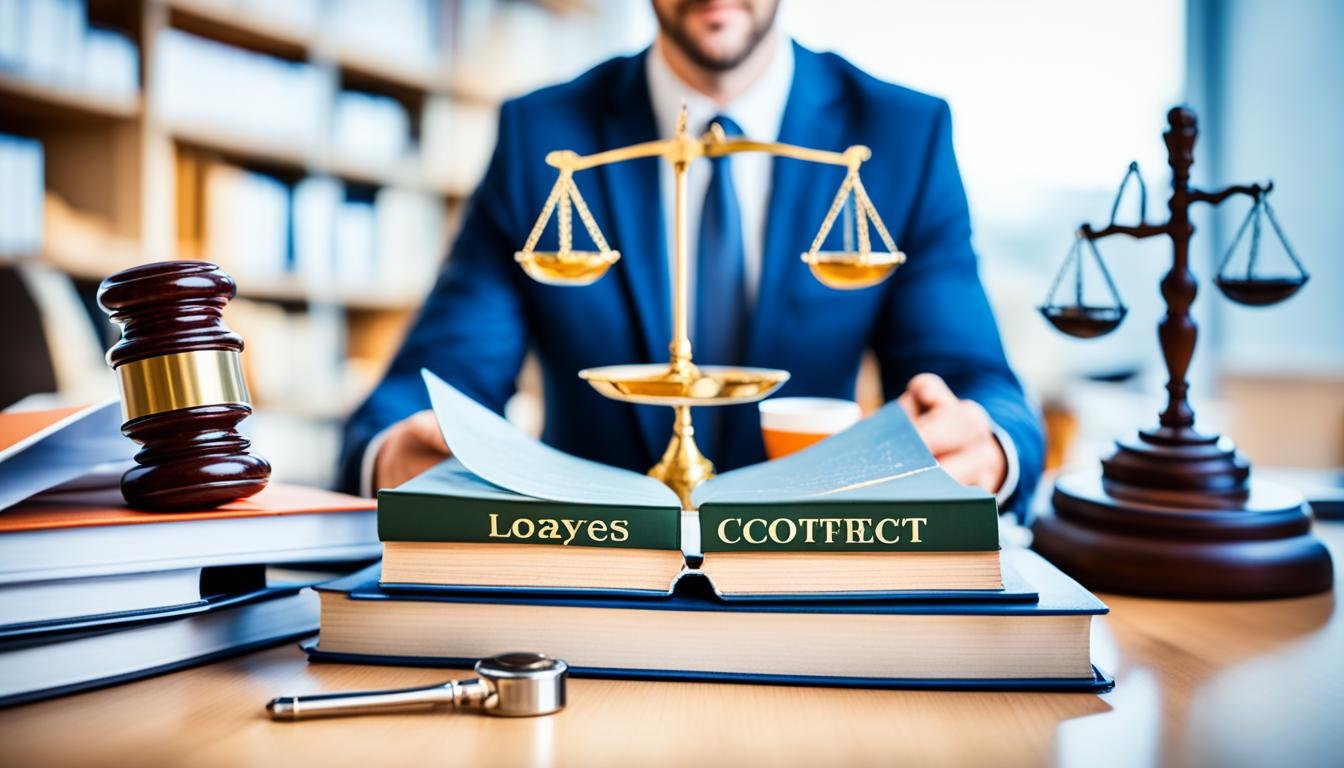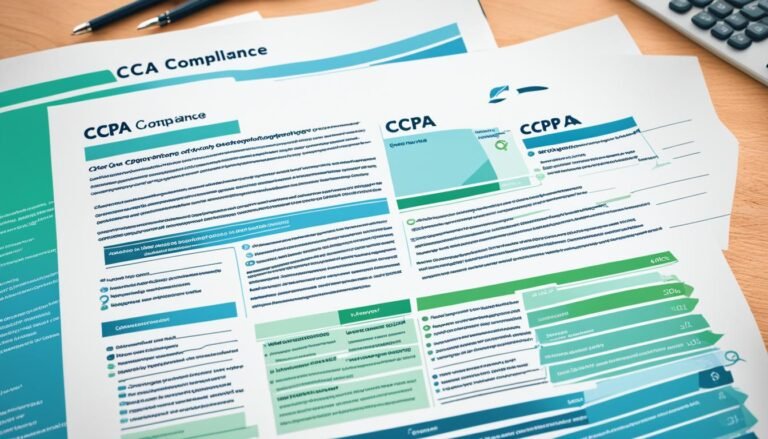Tort Law Primer for SME Owners
Small and medium-sized enterprises (SMEs) are a big deal in the United States. They make up over 99% of all businesses. If you own one, knowing the legal ins and outs is vital for your business’s safety and success. One key area is tort law. It deals with civil wrongs, like harm, and who’s responsible for paying for it.
This guide will dive into tort law for you, the SME owner. We’ll cover the main types of tort cases and how to lower your business’s legal risks. By the end, you’ll know how to keep your company safe under tort law.
Key Takeaways:
- Small and medium-sized enterprises (SMEs) make up over 99% of all businesses in the United States.
- Tort law governs civil wrongs and provides a legal framework for addressing liability.
- Understanding tort law is crucial for SME owners to protect their businesses and manage legal risks effectively.
- Business liability refers to the legal responsibility of a business entity for its actions and any resulting harm or injury.
- Having appropriate insurance coverage, such as liability insurance, is an important component of effective risk management for SMEs.
What is Tort Law?
Tort law deals with civil wrongs that harm another person. This includes cases where someone is trying to make others face consequences for their actions. In tort law, people must be careful to not hurt others.
Any business owner, big or small, must look out for their customers, staff, and anyone else affected by their business. It’s their job to keep these people safe. They have to follow safety rules and laws and try to avoid accidents. If they don’t, they could end up in court.
Under tort law, there are different cases businesses might face. Negligence cases happen when a business doesn’t meet the care standards and someone gets hurt. Intentional torts are about direct harm, like someone hitting you on purpose. They can also be responsible for strict liability if their product is dangerous, even if they didn’t mean for anyone to get hurt.
Knowing these laws is crucial for business owners. Being informed and taking steps to prevent accidents can save their business from trouble. This way, they protect themselves from lawsuits and can focus on growing their business.
Types of Tort Claims
In tort law, SME owners need to know different claims. Knowing these claims helps manage legal risks. It also helps protect your business. Let’s look at major categories:
Negligence
Negligence is the top tort claim type. It happens when a business owner doesn’t take reasonable care. This causes harm or injury to someone. Proving negligence shows the defendant failed their duty of care. This is the duty to act cautiously.
Intentional Torts
Intentional torts are on purpose and cause harm. They include assault, battery, defamation, and false imprisonment. To win intentional tort claims, you must show the defendant meant to harm.
Strict Liability
Strict liability is about very risky activities. In these cases, the defendant is responsible for any harm, even without proof of negligence. This applies to products, wild animals, and more.
Product Liability
A specific claim, product liability, deals with defective products. This includes design or manufacturing flaws. It also covers products with inadequate warnings. Manufacturers, distributors, and sellers can be sued for damages.
Professional Negligence
Professional negligence is for experts who don’t meet standards in their field. This includes doctors, lawyers, and architects. You have to prove they didn’t provide proper care, leading to harm or loss.
It’s key for SME owners to know these claims and assess legal risks. By understanding liabilities and getting legal help, SME owners can protect their businesses. This helps avoid legal troubles in the field of tort law.
Understanding Business Liability
Business liability is crucial for SME owners. It’s about the legal responsibility for actions and harm. Knowing one’s liability helps manage the risks.
Personal liability affects sole proprietors and partners. They are liable for business debts. This could risk their personal assets in a lawsuit, like their home and car. It brings stress and big financial issues to SME owners.
To decrease personal liability, owners can choose limited liability entities. Options include limited liability companies (LLCs) and corporations. These limit the liability to the business assets. Thus, personal assets are usually safe from business debts or lawsuits.
A limited liability company is a great option. It mixes corporation benefits with flexible management and tax structures. It safeguards personal assets while offering a simpler way to manage taxes.
– Jane Smith, Business Lawyer
Comparative Analysis of Business Liability Structures
| Business Structure | Personal Liability | Separate Legal Entity | Taxation |
|---|---|---|---|
| Sole Proprietorship | Unlimited personal liability | No | Personal tax rates |
| Partnership | Unlimited personal liability | No | Pass-through taxation |
| Limited Liability Company (LLC) | Limited personal liability | Yes | Flexible (can choose to be taxed as a partnership or corporation) |
| Corporation | Limited personal liability | Yes | Corporate tax rates |
This table compares various business liability structures. It shows personal liability, if a separate legal entity is created, and tax rules. Structures like LLCs and corporations protect the owners’ personal assets.
Deciding on the best liability structure requires professional advice. The business’s nature, owner count, and the need for asset protection matter. These factors help in choosing wisely.
Importance of Insurance
SME owners must make sure they have the right insurance. They need business insurance, liability insurance, and more. These insurances protect businesses from financial loss due to lawsuits or other claims.
Liability insurance is key, covering the business’s potential legal problems. If a lawsuit happens, this insurance can handle legal fees and payments. It keeps the business owner from facing all financial impacts alone.
Professional liability insurance is critical for SMEs that provide services. It protects against claims of professional mistakes or negligence. For consultants, healthcare workers, lawyers, and others, this insurance is a must.
Product liability insurance is vital if SMEs make, sell, or distribute products. It helps if a product harms a customer. Since these claims can be very expensive, this insurance is an important safety measure.
Insuring a business is key to managing risks. It saves the business from large financial hits that could close it. With insurance, owners can focus on their work without worry about legal or financial problems.
The Role of Insurance in Risk Management
Insurance is a cornerstone of risk management for SMEs. It supports businesses when things go wrong. It allows owners to focus on growth, knowing they have a backup plan.
Key Benefits of Insurance for SME Owners
- Financial Protection: Insurance guards against major financial hits, like lawsuits or damage claims.
- Legal Compliance: It meets some legal requirements, ensuring the business is up to code.
- Enhanced Credibility: Insurance shows the business is trustworthy, improving its reputation.
- Business Continuity: It helps the business stay afloat during tough times, supporting ongoing operations.
- Peace of Mind: It lets owners concentrate on their work, secure in the knowledge they’re protected.
Without a doubt, insurance is crucial for SMEs. It helps manage risks, keeps the business safe, and promotes future growth. By choosing the right coverage, SME owners can protect their business and thrive.
Legal Considerations for Business Owners
Running a business has many legal aspects. These are important for following the law and keeping your business safe. Knowing the legal stuff is key for small and medium-sized business owners. It helps them through the maze of legal rules and protects their companies.
Contracts
For business owners, working with contracts is essential. These documents lay out the agreement terms between the business and others like customers or employees. Making sure contracts are clear, legal, and protect the business is a must.
Compliance with Laws and Regulations
Folks in business need to follow the law. This means understanding and meeting legal rules like tax and labor laws. Not doing so could lead to fines or harm your business’s name.
Intellectual Property Rights
For those in creative fields or with unique ideas, protecting your work is key. This involves getting patents, trademarks, or copyrights. Doing this stops others from copying your work without permission.
Employment Law
Employment laws are about how employers and employees should treat each other. They cover hiring, time off, pay, and safety at work. Knowing and following these laws is essential. It helps keep the workplace fair and avoids legal troubles.
Regulatory Requirements
Business owners must also meet industry rules and get any needed permits. They need to follow consumer protection and other laws. Doing so lets them run a legal business and dodge potential legal or financial issues.
Dealing with legal matters is how business owners can protect their enterprise. It lessens the legal trouble risk and safeguards their interests. Talking to legal experts and keeping up with law changes can help.
Managing Legal Risks
It’s crucial for business owners to handle legal risks effectively. By spotting and looking into these risks, and then taking action, they can protect their businesses. This approach helps business owners avoid legal fights that might harm them.
To manage legal risks, start with a detailed risk check. Look into possible issues like contract problems or breaking rules. Knowing these risks lets you make plans to deal with them in advance.
Getting advice from lawyers also plays a big part. They can guide you through laws and help touch up your legal papers. This support is key to smooth business operation.
Avoiding court fights is smart for legal risk management, too. Setting up clear steps for solving problems can save a lot of trouble. With a legal guide, you can deal with disagreements wisely.
Doing checks on legal rules, training your team on what’s right, and keeping good records are also wise moves. This keeps legal issues at bay. It’s about staying up to date and following the rules.
Benefits of Effective Legal Risk Management:
- Minimize financial losses and legal expenses associated with lawsuits and disputes.
- Enhance your business’s reputation and credibility with stakeholders.
- Ensure compliance with laws and regulations, avoiding penalties and legal repercussions.
- Protect your intellectual property rights and confidential information.
- Improve relationships with business partners, customers, and employees by demonstrating a commitment to ethical conduct and legal compliance.
“Effective legal risk management involves identifying potential legal risks, assessing their likelihood and impact, and implementing proactive measures to mitigate or avoid those risks.”
Handling legal risks well lets business owners focus on growth. By working closely with legal experts and being proactive, they build a solid business. Dealing with legal matters correctly is essential to avoid problems.
Importance of Small Business Legal Advice
For small and medium-sized enterprise (SME) owners, getting legal advice is key. A trusted legal counsel guides them through the many legal requirements. They also help SME owners understand their obligations.
Access to reliable legal advice is crucial for protecting businesses.
Legal consultations are not one-size-fits-all. They give advice tailored to each business’s needs. This means SME owners get help that fits their business goals. Whether it’s contract checks, legal compliance, or risk planning, legal experts are ready to help.
Also, legal pros can help SME owners with contracts. They make sure the owner’s interests are protected. With legal support, SME owners can avoid risks and costly disputes later.
Legal advice also equips SME owners for tough situations like disputes. With a skilled legal team, they can tackle problems effectively. This helps reduce business stops and financial hits from disputes.
Overall, legal advice is key for SME owners to stay ahead of legal issues. Working with legal pros keeps SME owners up to date with laws. This allows them to protect their businesses and stay compliant.
Benefits of Small Business Legal Advice:
- Expert guidance in various legal matters
- Help navigating complex legal requirements
- Tailored advice based on business needs
- Protection of business interests through contract review and negotiation
- Assistance with dispute resolution and litigation
- Proactive measure to mitigate potential legal risks
By valuing legal advice, SME owners can make smarter decisions. This helps keep their businesses successful for the long term.
Compliance and Responsibilities
Small and medium-sized enterprise (SME) owners play a key role in keeping their business on the right track. They must meet legal requirements and follow ethical guidelines. Doing so helps them run their business in a responsible way that lasts.
There are several important areas of responsibility for SME owners:
- Legal Compliance: It’s vital for SME owners to know the laws that affect their business. They need to have the right permits, follow employment laws, and keep their financial records straight. They also must make sure their workplace is safe.
- Regulatory Compliance: Beyond the basics, SME owners face specific rules for their industry. They might need to protect data better, follow green rules, or respect consumer rights. Meeting these rules keeps their business running smoothly and out of trouble.
- Ethical Obligations: Running a business ethically means being honest and fair. SME owners need to value their employees, customers, and partners, and make sure everyone has a fair shot. They should also welcome all kinds of people at work.
- Legal Framework: Knowing the legal side of business is crucial for SME owners. They should understand contracts, how to protect their ideas, and how to solve disagreements. Being familiar with their industry’s or area’s laws is a must.
“Compliance is not just about meeting legal requirements; it is about building a culture of integrity and corporate responsibility.”
By doing their part in compliance, SME owners gain trust. They also boost their business’s reputation and lessen both legal and reputation risks. This is good for business in the long run.
Next, we’ll look at the importance of getting legal advice for small businesses. We’ll see how it can make the legal world simpler for SME owners.
Conclusion
It’s key for small and medium enterprise (SME) owners to know tort law to keep their businesses safe. They should learn about different tort claims, business liability, and why insurance and legal rules are vital. This knowledge helps them deal with legal stuff and keep their businesses going strong for a long time.
Getting advice and taking care of legal risks early are important for SME owners. It helps them follow the law, look out for their interests, and start their businesses right. Asking legal experts for help means they can get advice on making contracts, checking risks, or solving problems.
Understanding tort law well lets SME owners lower legal and reputation risks. It also helps in following laws closely and laying a good legal groundwork for their businesses. With the right focus on legal duties and handling risks smartly, SMEs can stay safe and grow in today’s tough business world.
FAQ
Q: What is tort law?
A: Tort law is a branch of civil law. It deals with harm caused by one person to another. This harm can be physical, like injury, or related to property or other damages.
Q: What are the different types of tort claims?
A: There are several types of tort claims. This includes negligence, intentional torts, strict liability, product liability, and professional negligence.
Q: What is business liability?
A: Business liability is a company’s legal responsibility for its actions. This includes any harm or injury caused. It depends on the business’s ownership, like if it’s a sole proprietorship or a partnership.
Q: Why is insurance important for small businesses?
A: Insurance is vital for small businesses for financial protection. It helps if there’s a lawsuit or other claims. There are specific types like liability and product liability insurance to lessen risks.
Q: What are the legal considerations for small business owners?
A: There are many legal things small business owners must keep in mind. This includes making contracts, protecting intellectual property, and following employment laws. It also means meeting government regulations.
Q: How can small business owners manage legal risks?
A: To manage legal risks, owners should look for potential problems. They should understand how these risks might affect their business. They can also take steps to prevent problems or handle them if they arise. This might involve getting advice from lawyers, planning how to deal with disagreements without going to court, and making sure their business follows the law.
Q: Why is small business legal advice important?
A: Getting legal advice helps small businesses stay on the right side of the law. It helps them deal with complicated legal issues. A lawyer can offer expert advice that fits the business’s specific situation. This helps protect the business’s interests.
Q: What are the compliance and responsibilities for small business owners?
A: Small business owners must follow the law and be ethical. They need to keep accurate financial records and protect customer information. They’re also responsible for making sure their workplace is safe and fair.







